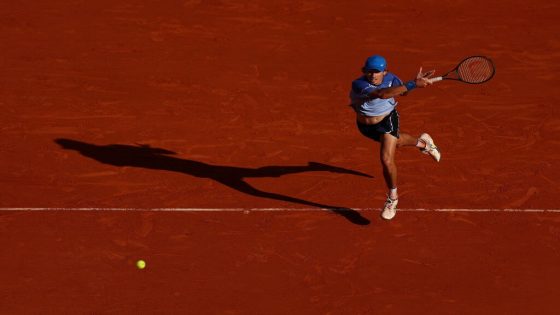A little more than a month ago, a series of meetings of the top leaders of tennis ended in acrimony. The heads of the Grand Slams accused the leaders of the tour of undercutting their efforts to reshape the sport by plotting a series of backchannel deals with Saudi Arabia.
Now, another summit is about to get underway.
After weeks of virtual discussions The leaders of the Grand Slams and the men’s and women’s tennis tours will convene in London this week to try to forge some sort of compromise that will solve a series of challenges facing the game.
Those problems essentially boil down to this:
How can they bring more money into tennis and grow interest amid increasing competition, without overtaxing players who are demanding a streamlined schedule and compensation comparable to their far wealthier counterparts in other sports?
The ultimate solution, people connected to the discussions say, could even spell significant changes or perhaps even the end of the Paris Masters — a top indoor men’s tournament known as ‘Bercy’ — in favor of a new event in Saudi Arabia.
At the most recent summit with the sport’s top leaders, Gilles Moretton, the president of France’s Tennis Federation, the FFT, which owns the French Open and the Bercy tournament, said he would not let Bercy be the obstacle to peace in the sport, opening the door to a potential compromise.

Djokovic last won Paris (Julien de Rosa/AFP via Getty Images)
The media relations staff of the FFT did not respond to requests for comment.
The reporting in this story is based on interviews with several people involved with and with knowledge of the ongoing discussions. They requested anonymity to avoid jeopardizing their professional relationships. All described the situation as fluid with the ultimate solution, if one can be found, still a long way off even with Moretton’s offer of the Bercy olive branch.

GO DEEPER
How to fix tennis
Tennis, which is run by at least seven separate organizations, has long been rife with conflicts between rival groups looking to protect their specific interests.
This latest civil war has ostensibly pitted the Grand Slams against the men’s and women’s tours, but mainly Andrea Gaudenzi, the chairman of the ATP Tour.
The Grand Slams — Wimbledon, and the French, U.S. and Australian Opens — want to create a premium tour that would resemble Formula 1 racing. It would include their competitions, 10 top-level mixed, outdoor events, and a season-ending tour finals for the top men and women. It would start in January and end by early November.
Only roughly the top 100 players would qualify for the premium tour. Another series of lower-level tournaments would exist largely as a qualifying competition for the premium tour, though players from the premium tour may be able to participate in those events to receive appearance fees and match practice — and to make them more appealing to fans.
The plan has existed largely as a calendar and a series of reports from consultants projecting a boost in money from sponsorships and increased payments for television and streaming rights. What it does not yet have is any concrete financial backing, a major sticking point for the owners of the top-level tournaments the Grand Slams want to include in their premium tour. What it does have is appeal to both players and fans, as a respite to a schedule that is tough to follow on-court and on-screen because of its, at times, illogical jumps around the globe and relentless run of matches.
The venture would be a big lift for the Grand Slams, especially now, as they try to forge ahead on other projects. The USTA, which owns the U.S. Open, has begun to seek approval for another major renovation of the Billie Jean King National Tennis Center, which would include construction of a new player performance center, a hospitality hub and, eventually, renovations to Arthur Ashe Stadium. Wimbledon is pursuing a massive expansion onto a neighboring golf course.

GO DEEPER
Saudi Arabia’s new $1billion proposal and the battle to control tennis
On the other side iGaudenzi, the chairman of the ATP Tour, who largely favors a status quo that many players say is unacceptable, and that is before Gaudenzi’s plan to add yet another top-level tournament to the schedule, likely in Saudi Arabia. His counter to the premium plan would be its limitations on showcasing tennis as a remarkable, 24/7/365 sport, one of few truly global spectacles.

The ATP tour is currently in Monte Carlo; the WTA in Stuttgart from Monday (Mateo Villalba/Getty Images)
That tournament is at the center of Gaudenzi’s promise of roughly $1billion in investments in tennis from Saudi Arabia, a country with an ugly record of human rights abuses, laws that oppress women, and where homosexuality can result in a death sentence. The kingdom’s sovereign wealth fund, the Public Investment Fund, is a leading bidder for that event, and the women’s tour is likely to join if Saudis win the auction, which people involved say should conclude sometime this spring.
Inside Saudi Arabia’s growing influence in sport
This month, the women’s tour announced a lucrative but controversial three-year deal with Saudi Arabia’s Ministry of Sport to hold its season-ending WTA Finals in Riyadh.
While Gaudenzi’s plan comes with an infusion of cash, mostly from the sale of the license for the new tournament, critics say it lacks any real plan for sustained future growth. Nothing would change about the sport’s fractured business, in which tournaments compete against one another for sponsorships and television deals.
His move is akin to a sports league selling an expansion franchise to a new city. Only, in this case, Gaudenzi is essentially selling a slot in the calendar without the ability to create more weeks of the year.
That problem sparked this latest war between the Grand Slams and Gaudenzi, who last summer tried to cut a deal to hold a tournament in Saudi Arabia at the start of the season. Early January is the only month of the professional tennis season when there is no Grand Slam or top-level event for either tour and the Saudi climate would allow such an event to take place.
A top-level January tournament in Saudi Arabia for men and women would likely kill the tuneup events for the Australian Open in Australia and New Zealand that Tennis Australia, the owner and organizer of the Australian Open, largely controls. In response, Craig Tiley, the chief executive of Tennis Australia, pushed to create the premium tour, which could be a major blow to Gaudenzi’s ATP Tour, and the scores of lower-level tournaments that don’t make the premium tour.

Changes would affect the WTA and ATP tours (Christian Kaspar-Bartke/Getty Images for ITF)
An obvious compromise, people involved with the talks say, is to find a way to hold a tournament in Saudi Arabia, collect the roughly $1billion and make it part of a premium tour, with money from that circuit providing support to the smaller tournaments.
But if a Saudi tournament did not take place in January, there are only two other months when the Saudi climate would even allow it — immediately following the Australian Open in February, when both tours play events in Dubai and the women play a tournament in Doha, or in October, in place of Bercy.
(Top photo: Julian Finney/Getty Images)



